

45,000+ students realised their study abroad dream with us. Take the first step today
Meet top uk universities from the comfort of your home, here’s your new year gift, one app for all your, study abroad needs, start your journey, track your progress, grow with the community and so much more.

Verification Code
An OTP has been sent to your registered mobile no. Please verify

Thanks for your comment !
Our team will review it before it's shown to our readers.

- School Education /
Essay on Vikram Batra: The Sher Shah of Kargil

- Updated on
- Oct 7, 2024
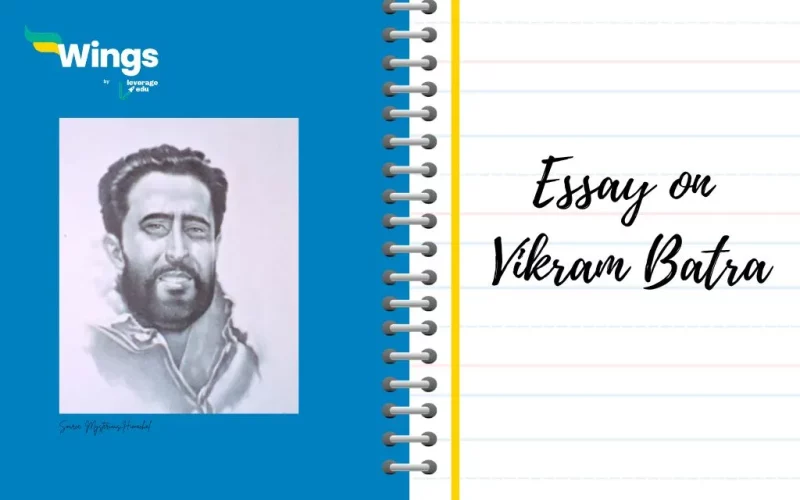
Essay on Vikram Batra: Have you heard of Captain Vikram Batra? A courageous, patriotic soldier who sacrificed his life for his nation. His sacrifice lives on in the hearts of all Indians. Vikram Batra was born on September 9, 1974, in Palampur, Himachal Pradesh. His heroic acts during the 1999 Kargil war between India and Pakistan live in the history of the Indian army. In this blog, we shall write an essay on Vikram Batra . In this essay, we will discuss Vikram Batra’s early life, as well as his achievements and actions during the Kargil War. So, if you want to learn more about this courageous person, this blog is for you.
Essay on Vikram Batra in 1000 Words
Vikram Batra is a name that awakens patriotism, heroism and sacrifice in the hearts of all Indians. He was born on September 9, 1974, in Palampur district of Himachal Pradesh. VIkram Batra was an Indian army officer who posthumously received the Param Vir Chakra, India’s highest military honour, for his courageous actions during the 1999 Kargil War between India and Pakistan. His bravery and dedication to the nation secured his place in the history of Indian military.
Vikram Batra was born into the family of school principal G.L. Batra and teacher Kamal Kanta Batra.From a young age, he showed leadership qualities and interest in sports, especially those that demanded physical endurance and agility. He was an excellent student who managed to balance his academics and extracurricular activities effortlessly. He developed a strong interest in the military forces after being inspired by his mother’s lessons and the soldiers he usually saw posted in his area. He proved himself during his time as a cadet in the National Cadet Cops (NCC), which set up the path for his future in the Indian army.
Vikram Batra attended Central School in Palampur before pursuing a science degree at DAV College in Chandigarh. During his college years, he also passed the Combined Defence Services (CDS) examination, which granted him admission to the Indian Military Academy (IMA), Dehradun. Vikram Batra enrolled at the Indian Military Academy in Dehradun in 1996, and he was commissioned as a lieutenant in the Indian Army in December 1997. His early years were marked by intensive training and low postings in sensitive regions, such as Sopore in Jammu and Kashmir. He was assigned to the 13th Battalion, Jammu and Kashmir Rifles.
Batra was known for his enthusiasm, positive attitude, and immense physical and mental toughness. He was also popular among his men for his tactical decisions, empathy and concern for their welfare.In the summer of 1999, the Indian army was called into action to take on Pakistani forces that had taken control of several locations in Jammu and Kashmir’s Kargil sector. The Kargil War was a historic point in Indian military history, requiring the greatest bravery from soldiers operating in extreme altitudes and hostile conditions. During that time, Vikram Batra was appointed as the captain.
The Indian military launched ‘Operation Vijay’ in Kargil, which was a difficult operation due to the challenging terrain and positions of the enemy forces. The Pakistanis had taken many peaks, giving them an advantage against the Indian Army. Despite the odds, the Indian Army, driven by the determination of officers such as Vikram Batra, made many successful attacks to recover the territory.
Captain Vikram Batra showed extreme bravery during the capture of Point 5140. It was one of the most important peaks occupied by Pakistani forces and its recapture would open up the way for further enemy-held territories. Batra’s task was to lead his forces in a night attack on Pakistani soldiers in confirmed positions. Despite the obstacles, Vikram Batra led from the front with incredible bravery. His leadership was crucial to the operation’s success. On the night of June 19, 1999, Captain Batra and his crew made a quick attack on enemy positions. Batra’s men were able to defeat the enemy and capture Point 5140. His success in this mission was a turning point in the Kargil War .
After capturing Point 5140, Vikram Batra radioed back the code words “Yeh Dil Maange More!” which means “My heart desires more.” This phrase became famous in India, and his bravery throughout the mission earned him the nickname “Sher Shah,” which means “Lion King,” among his fellow soldiers. Following the capture of Point 5140, Batra and his men were assigned another task: capture Point 4875. This peak was far more important than the previous one as it has control over a large area and could determine the course of the war. Captain Batra led the attack again on the night of July 7, 1999. Under severe enemy fire, he led his men in the same manner as previously.
During the battle, one of Batra’s fellow officers got serious injuries. Without hesitation, Captain Batra went to help him, dragging him to safety while exposing himself to enemy fire. Unfortunately, during this process, he was killed by enemy fire. His final words, according to his comrades, were “Jai Mata Di”. His bravery and leadership helped the successful capture of Point 4875, which was eventually called Batra Top in his honour. His heroism earned him the Param Vir Chakra posthumously.
Captain Vikram Batra remains a symbol of bravery, patriotism and selflessness. His story continues to inspire generations of Indians, particularly young individuals who want to serve in the military. Various roads, schools and military peaks have been named after him, ensuring that his memory lives in the hearts of countrymen. His story was presented to the big screen in 2021 with the film Shershaah, which depicted his journey from a little child in Palampur to a national hero who sacrificed his life for the country. This movie rekindled the spirit of patriotism among the Indians and reminded the nation of the sacrifices made by the brave soldiers during the Kargil War. His life shows the great value of courage, honour, and duty. Vikram Batra’s sacrifice was a reminder of the cost of freedom and the courage necessary to fight for it.
Vikram Batra was a symbol of India’s spirit: strong, fearless, and selfless. His life and sacrifice during the Kargil War show the highest ideals of military service and national pride. He not only fought for his country but also gave up his life so that his fellow countrymen could live in peace. Today, as we celebrate his legacy, we are reminded of the numerous warriors who have fought and continue to fight for the honour of our country. Vikram Batra’s story will continue to inspire future generations, showing that great heroes never die; they live on in the hearts of those who admire them.
Paragraph on Vikram Batra in 300 Words to Include in Essay
Captain Vikram Batra, also known as “Sher Shah” of the Indian army, is known for his bravery during the Kargil War in 1999. He was born September 9, 1974, in Palampur, Himachal Pradesh. Batra has had a strong sense of patriotism and leadership since an early age. After completing his studies, he was commissioned as an officer in the Indian Army and assigned to the 13th Battalion, Jammu and Kashmir Rifles.
During the Kargil War, his life took a turning point, and he became a national hero for his bravery. During the battle, Captain Batra played a crucial role in the capture of Point 5140. His leadership and bravery were important to the success of the Kargil War, gaining him the famous nickname “Sher Shah,” which means “Lion King.” His famous words “Yeh Dil Maange More,” which he radioed back after successfully capturing Point 5140, represented his unwavering determination and desire for more victories. Batra’s success in this mission boosted the Indian Army’s chances for future victories.
However, Captain Batra’s greatest act of bravery occurred during the attack on Point 4875. Despite fierce enemy fire, Batra commanded his men with great courage. In an act of bravery, he risked his life to save a fellow soldier who had been hurt during the mission. Unfortunately, while rescuing his comrade, Captain Batra was killed. His sacrifice not only ensured the mission’s success but also established him as one of India’s greatest military heroes.
Captain Vikram Batra was posthumously awarded India’s highest military honour, the Param Vir Chakra, in recognition of his bravery and dedication. His memory continues to inspire future generations of Indians, and he is a symbol of bravery, patriotism and selflessness. Many schools, roads and military peaks have been named after him, and his story is immortalised in the popular film Shershaah. Captain Vikram Batra’s life is a powerful reminder of the sacrifices made by soldiers in defence of their country, and his courage will be remembered throughout Indian history.
Also Read: Lines on Kargil Vijay Diwas in English
Ans. Vikram Batra was an Indian army officer who posthumously received the Param Vir Chakra, India’s highest military honour, for his courageous actions during the 1999 Kargil War between India and Pakistan.
Ans. Captain Vikram Batra is a symbol of outstanding bravery and is known as one of India’s greatest military heroes. He was born September 9, 1974, in Palampur, Himachal Pradesh. He had always been interested in patriotism, which led him to join the Indian army. He joined the Indian Army and achieved to the rank of officer in the 13th Battalion of the Jammu and Kashmir Rifles. During the 1999 Kargil War, Batra played an important role in recapturing Point 5140. After the victory, his famous words, “Yeh Dil Maange More,” showed his unwavering attitude and earned him the nickname “Sher Shah”. Batra’s most brave act was during the attack on Point 4875 when he was fatally shot while saving an injured comrade. His bravery and sacrifice contributed to the mission’s success, and he was posthumously awarded the Param Vir Chakra, India’s highest military honour. Vikram Batra’s story reflects selflessness, courage, and patriotism and continues to inspire future generations.
Ans. Captain Vikram Batra’s success in capturing Point 5140 showed leadership and his bravery in the Kargil War, earned him the famous nickname “Sher Shah,” which means “Lion King.”
Popular Essay Topics
For more information on such interesting topics, visit our essay writing page and follow Leverage Edu.
Bhumika Sharma
A writer with a fresh perspective on thoughts, I have an year of experience in writing the blogs on various topics. Here, you will find my blogs for the students and education purpose.
Leave a Reply Cancel reply
Save my name, email, and website in this browser for the next time I comment.
Contact no. *
thanks for the information about Vikram Batra
thanks for helping me in my competition i hope i get 1st

Connect With Us
45,000+ students realised their study abroad dream with us. take the first step today..

Resend OTP in

Need help with?
Study abroad.
UK, Canada, US & More
IELTS, GRE, GMAT & More
Scholarship, Loans & Forex
Country Preference
New Zealand
Which English test are you planning to take?
Which academic test are you planning to take.
Not Sure yet
When are you planning to take the exam?
Already booked my exam slot
Within 2 Months
Want to learn about the test
Which Degree do you wish to pursue?
When do you want to start studying abroad.
January 2025
September 2025
What is your budget to study abroad?

How would you describe this article ?
Please rate this article
We would like to hear more.
Have something on your mind?

Make your study abroad dream a reality in January 2022 with
India's Biggest Virtual University Fair

Essex Direct Admission Day
Why attend .

Don't Miss Out
Essay Curve
Essay on Vikram Batra – Samples, 10 Lines to 1500 Words

Essay on Vikram Batra: Vikram Batra, also known as Sher Shah, was a brave and courageous Indian soldier who made the ultimate sacrifice for his country during the Kargil War in 1999. His heroic actions and unwavering determination to protect his fellow soldiers have made him a symbol of bravery and patriotism in India. In this essay, we will delve into the life and legacy of Vikram Batra, exploring the impact he had on his country and the inspiration he continues to provide to future generations.
Table of Contents
Vikram Batra Essay Writing Tips
1. Start by introducing Vikram Batra, a brave Indian soldier who was posthumously awarded the Param Vir Chakra for his bravery during the Kargil War in 1999.
2. Provide a brief overview of Vikram Batra’s background, including his childhood, education, and decision to join the Indian Army.
3. Discuss Vikram Batra’s heroic actions during the Kargil War, highlighting specific instances of his courage and leadership on the battlefield.
4. Explain how Vikram Batra’s famous war cry “Yeh Dil Maange More!” became a symbol of his determination and fearlessness in the face of danger.
5. Explore the impact of Vikram Batra’s actions on the outcome of the Kargil War, emphasizing his role in capturing strategic enemy positions and turning the tide of the conflict in India’s favor.
6. Discuss the legacy of Vikram Batra, including the numerous honors and awards he received posthumously for his bravery and sacrifice.
7. Reflect on the significance of Vikram Batra’s story in inspiring future generations of Indian soldiers and civilians to uphold the values of courage, patriotism, and selflessness.
8. Consider the lessons that can be learned from Vikram Batra’s life and legacy, such as the importance of standing up for one’s beliefs, facing challenges with bravery and determination, and always striving for excellence in all endeavors.
9. Conclude the essay by summarizing the key points discussed and reiterating the lasting impact of Vikram Batra’s heroism on the nation and its people.
10. Remember to proofread and edit your essay for clarity, coherence, and grammar before submitting it for evaluation.
Essay on Vikram Batra in 10 Lines – Examples
1. Vikram Batra was born on September 9, 1974, in Palampur, Himachal Pradesh, India. 2. He was an officer in the Indian Army and served in the Kargil War in 1999. 3. Batra was known for his bravery and leadership during the war. 4. He was awarded the Param Vir Chakra, India’s highest military decoration, for his actions during the war. 5. Batra’s famous war cry “Yeh Dil Maange More!” became a symbol of his courage and determination. 6. He was instrumental in capturing Point 5140, a strategic peak in the Kargil region. 7. Batra was tragically killed in action during the war on July 7, 1999, at the age of 24. 8. His sacrifice and heroism have inspired generations of Indians and he is considered a national hero. 9. Several books, movies, and documentaries have been made about his life and achievements. 10. Vikram Batra’s legacy continues to live on as a symbol of courage, sacrifice, and patriotism.
Sample Essay on Vikram Batra in 100-180 Words
Vikram Batra was a brave and courageous Indian soldier who served in the Indian Army during the Kargil War in 1999. He was born on September 9, 1974, in Himachal Pradesh, India. Batra was known for his fearless attitude and exceptional leadership skills on the battlefield.
During the Kargil War, Batra played a crucial role in capturing Point 5140, a strategic peak in the war zone. He fearlessly led his troops in the face of heavy enemy fire and successfully captured the peak, earning him the nickname “Sher Shah” (Lion King). His famous war cry “Yeh Dil Maange More!” became a symbol of his bravery and determination.
Tragically, Vikram Batra was martyred in action during the war, but his legacy lives on as a symbol of courage and sacrifice. He was posthumously awarded the Param Vir Chakra, India’s highest military decoration, for his exceptional bravery and leadership on the battlefield. Vikram Batra will always be remembered as a true hero of India.
Short Essay on Vikram Batra in 200-500 Words
Vikram Batra, also known as Sher Shah, was a brave and courageous Indian soldier who made the ultimate sacrifice for his country during the Kargil War in 1999. Born on September 9, 1974, in Himachal Pradesh, Batra was a natural leader and excelled in academics and sports from a young age. He joined the Indian Military Academy in 1996 and was commissioned into the Indian Army as a lieutenant.
During the Kargil War, Batra was deployed in the Dras sector, where he led his troops in several successful missions to recapture strategic peaks from Pakistani intruders. One of his most famous missions was the capture of Point 4875, also known as Peak 5140, where he famously radioed back to his commanding officer, “Yeh dil maange more!” (This heart wants more!) after capturing the peak. This phrase became a rallying cry for the Indian Army during the war.
Batra’s bravery and leadership skills were unmatched, and he was posthumously awarded the Param Vir Chakra, India’s highest military decoration, for his actions during the war. His citation read, “Lieutenant Vikram Batra, with utter disregard to his personal safety, inspired his men to fight the enemy and recapture Point 4875. During the capture of Point 4875, he was killed in action, but his actions ensured the success of the mission.”
Batra’s sacrifice and heroism inspired a generation of young Indians and cemented his legacy as a national hero. His story was immortalized in the Bollywood film “Shershaah,” which was released in 2021 and starred actor Sidharth Malhotra in the lead role. The film brought Batra’s story to a wider audience and shed light on the sacrifices made by Indian soldiers during the Kargil War.
Vikram Batra’s legacy continues to inspire young Indians to serve their country with courage and dedication. His selfless actions and unwavering commitment to the nation serve as a reminder of the sacrifices made by the armed forces to protect the sovereignty and integrity of India. Batra’s bravery and leadership skills will always be remembered, and his name will forever be etched in the annals of Indian military history.
Essay on Vikram Batra in 1000-1500 Words
Vikram Batra, also known as Sher Shah, was a brave and courageous Indian soldier who made the ultimate sacrifice for his country during the Kargil War in 1999. His heroic actions and selfless dedication to his duty have made him a symbol of bravery and patriotism in India. In this essay, we will explore the life and legacy of Vikram Batra, and how his actions continue to inspire generations of Indians.
Vikram Batra was born on September 9, 1974, in Palampur, Himachal Pradesh. From a young age, he showed a keen interest in the military and dreamed of serving his country. After completing his schooling, he joined the Indian Military Academy in Dehradun and was commissioned into the Indian Army in 1997. He was assigned to the 13 Jammu and Kashmir Rifles regiment, and it was during his time with this regiment that he would make his mark on history.
The Kargil War, also known as the Kargil conflict, was a military conflict between India and Pakistan that took place in the Kargil district of Jammu and Kashmir in 1999. The conflict began when Pakistani soldiers and militants infiltrated into Indian territory and occupied strategic positions in the mountains. The Indian Army launched a counter-offensive to evict the intruders, and it was during this time that Vikram Batra would display his bravery and valor.
During the Kargil War, Vikram Batra was deployed in the Dras sector, one of the most dangerous and challenging areas of the conflict. Despite facing heavy enemy fire and adverse weather conditions, he led his men with courage and determination. On June 19, 1999, during the capture of Point 5140, also known as Point 4875, he displayed exceptional bravery and valor. In a daring assault, he and his men managed to capture the enemy position, but not before he was seriously injured. Despite his injuries, he refused to be evacuated and continued to lead his men in battle.
It was during this assault that Vikram Batra uttered the famous words, “Yeh Dil Maange More!” (This heart wants more!), which would later become a rallying cry for the Indian Army. His actions on the battlefield earned him the Param Vir Chakra, India’s highest military decoration for valor, posthumously. He was the first Indian Army officer to be awarded the Param Vir Chakra during the Kargil War.
Vikram Batra’s bravery and sacrifice inspired his fellow soldiers and the entire nation. His selfless dedication to his duty and his willingness to lay down his life for his country serve as a shining example of patriotism and valor. His actions during the Kargil War have been immortalized in books, movies, and songs, and he continues to be remembered as a hero and a role model for generations of Indians.
After his death, Vikram Batra’s family and friends established the Captain Vikram Batra Foundation to honor his memory and support the education of underprivileged children. The foundation provides scholarships and financial assistance to students in need, and works to promote the values of patriotism, courage, and selflessness that Vikram Batra embodied.
In conclusion, Vikram Batra was a true hero and a shining example of bravery and sacrifice. His actions during the Kargil War will always be remembered and honored by the people of India. His legacy continues to inspire generations of Indians to serve their country with courage and dedication. Vikram Batra may have lost his life on the battlefield, but his spirit lives on in the hearts of all those who cherish freedom and honor the sacrifices of our brave soldiers. Jai Hind!
Related Essays
Essay on A Visit To A Fair – 10 Lines, 100 to 1500 Words
Value of Games And Sports – Essay in 10 Lines, 100 to 1500 Words
Essay on Importance of Teacher – 100, 200, 500, 1000 Words
Essay on A Visit To A Museum – 100, 200, 500, 1000 Words
Essay on Effect of Social Media On Youth
Essay on Shri Guru Nanak Dev Ji – Short & Long Essay Examples
Essay on Nuclear Family – Short Essay & Long Essay upto 1500 Words
Essay on Anudeep Durishetty – 10 Lines, 100 to 1500 Words
Essay on Non Violence – Samples, 10 Lines to 1500 Words
Covid 19 Responsive School – Essay in 10 Lines, 100 to 1500 Words
Leave a Comment Cancel reply
Save my name, email, and website in this browser for the next time I comment.

Paragraph on Vikram Batra 300 Words, 500 Words and 150 Words

Vikram Batra was a brave soldier in the Indian Army. He was born on September 9, 1974, in Palampur, Himachal Pradesh. Vikram became famous for his courage during the 1999 Kargil War. He led his team to important victories and inspired everyone with his words, “Yeh Dil Maange More.”
In this blog we will tells the story of Vikram Batra and his bravery through these paragraph on vikram batra 300 words, 500 words and 150 words.
Table of Contents
Paragraph on Vikram Batra 150 Words
Vikram Batra was a very brave soldier in the Indian Army. Born on September 9, 1974 and living in a small town called Palampur. As a child, he loved playing sports and was very good in school. When he grew up, he joined the Indian Army to protect his country. In 1999, during the Kargil War, Vikram Batra showed great courage. He led his team to capture important points from the enemy.
He encouraged his team by saying, “Yeh Dil Maange More,” which means “This heart wants more.” Sadly, he was hurt very badly in a battle and died on July 7, 1999. Because of his bravery, he was given the Param Vir Chakra, India’s highest award for soldiers. Vikram Batra is remembered as a true hero who loved his country and made the ultimate sacrifice to protect it.
Also read: Write a Descriptive Paragraph on Virat Kohli
Paragraph on Vikram Batra 300 Words
Vikram Batra was a brave soldier in the Indian Army. Born on September 9, 1974 and living in a small town called Palampur in Himachal Pradesh. Vikram was very smart and loved playing sports when he was a child. He was also very good in his studies and had many friends.
When Vikram grew up, he decided to join the Indian Army to serve his country. He became an officer and was very good at his job. In 1999, there was a big fight between India and Pakistan called the Kargil War. Vikram Batra was sent to fight in this war. He was very brave and led his team to capture important points from the enemy.
During one of the battles, Vikram and his team were fighting very hard. Even though it was very dangerous, he kept going and encouraged his team to keep fighting. He said, “Yeh Dil Maange More,” which means “This heart wants more,” showing his courage and determination. Sadly, Vikram Batra was hurt very badly in the fight and lost his life on July 7, 1999.
Vikram Batra became a hero because of his bravery and sacrifice. He was given a very special award called the Param Vir Chakra, which is the highest honor a soldier can get in India. People remember him as a great hero who loved his country and gave his life to protect it.
Vikram Batra’s story teaches us about courage, bravery, and the importance of loving and serving our country. He will always be remembered as a true hero.
Also read: Write a Short Paragraph on Importance of Newspaper
Paragraph on Vikram Batra 500 Words
Vikram Batra was a brave and courageous soldier in the Indian Army. Born on September 9, 1974 and living in a small town called Palampur in the state of Himachal Pradesh, India. As a child, Vikram was very active and loved playing sports. He was also very good in his studies and had many friends because he was kind and friendly.
When Vikram grew up, he decided to join the Indian Army because he wanted to serve his country and protect its people. He worked very hard and became an officer in the army. He was known for his leadership skills and his ability to stay calm even in difficult situations. His fellow soldiers admired him and looked up to him as a leader.
In 1999, there was a big fight between India and Pakistan called the Kargil War. Vikram Batra was sent to fight in this war. He showed great bravery and courage during the battles. He led his team to capture important points from the enemy, which helped India win the war. His bravery was an inspiration to everyone.
During one of the battles, Vikram and his team had to climb a steep mountain to fight the enemy. It was very dangerous, and the enemy was shooting at them from above. But Vikram did not give up. He encouraged his team to keep moving forward and kept saying, “Yeh Dil Maange More,” which means “This heart wants more,” showing his determination and bravery.
Even though it was very dangerous, Vikram and his team managed to capture the enemy’s position. But during the fight, Vikram was hurt very badly. He was shot while trying to save one of his fellow soldiers. Despite his injuries, he kept fighting until the end. Sadly, he lost his life on July 7, 1999.
Vikram Batra became a hero because of his bravery and the sacrifices he made for his country. He was awarded the Param Vir Chakra, which is the highest honor a soldier can receive in India. This award is given to soldiers who show extraordinary bravery and courage in the face of the enemy.
People all over India remember Vikram Batra as a true hero. His story is taught in schools, and many people look up to him as a role model. His bravery and dedication to his country are an inspiration to everyone. Vikram Batra’s story teaches us about the importance of courage, bravery, and the love for our country.
We should always remember Vikram Batra and the sacrifices he made for our country. He will always be remembered as a great hero who loved his country and gave his life to protect it. His story will continue to inspire future generations to be brave and to always stand up for what is right.
In conclusion, Vikram Batra was a brave soldier who showed extraordinary courage during the Kargil War. His bravery and sacrifice made him a true hero. We should always remember and honor him for his dedication and love for his country. He is a shining example of what it means to be a hero.

Team FreshEduIdeas is dedicated to providing helpful content on education, career growth, Study Tips & Personal Development Tips, helping learners and professionals achieve their goals. Join us on this journey of knowledge!
Related Posts

Write Me a Paragraph for My Girlfriend

Write a Paragraph About How to Stay Healthy

Write a Paragraph on How You Spend Your Summer Vacation
1 thought on “paragraph on vikram batra 300 words, 500 words and 150 words”.
Really Vikram Batra was a brave soldiers. Salute to him
Leave a Comment Cancel Reply
Your email address will not be published. Required fields are marked *
Save my name, email, and website in this browser for the next time I comment.

Essay on Captain Vikram Batra
Students are often asked to write an essay on Captain Vikram Batra in their schools and colleges. And if you’re also looking for the same, we have created 100-word, 250-word, and 500-word essays on the topic.
Let’s take a look…
100 Words Essay on Captain Vikram Batra
Captain Vikram Batra was born on September 9, 1974, in Palampur, Himachal Pradesh. He was a bright student and a sports enthusiast.
Military Career
In 1996, he joined the Indian Military Academy. He was commissioned into the 13 JAK Rifles of the Indian Army.
During the 1999 Kargil War, Captain Batra’s unit was tasked with recapturing Point 5140. His leadership led to the Indian victory.
Bravery and Sacrifice
On July 7, 1999, while rescuing an injured officer, Captain Batra was martyred. His last words were “Jai Mata Di”.
For his bravery, he was posthumously awarded the Param Vir Chakra, India’s highest military honor.
250 Words Essay on Captain Vikram Batra
Introduction.
Captain Vikram Batra, one of India’s most celebrated war heroes, displayed unparalleled bravery during the Kargil War in 1999. His extraordinary courage and indomitable spirit continue to inspire countless individuals.
Early Life and Induction into the Army
Born on September 9, 1974, in Palampur, Himachal Pradesh, Batra joined the Indian Military Academy in 1996. Commissioned in the Jammu and Kashmir Rifles, his leadership skills and dedication were evident from the beginning.

The Kargil War
During the Kargil War, Batra’s unit was tasked with recapturing Peak 5140. Despite the challenging terrain and heavy enemy fire, Batra led his team to victory, earning him the nickname ‘Sher Shah’. His famous battle cry, “Yeh Dil Maange More!”, became a symbol of India’s fighting spirit.
Supreme Sacrifice
Batra’s next mission was to recapture Peak 4875. Despite being severely injured, he killed five enemy soldiers in close combat. However, while rescuing an injured comrade, Batra was fatally wounded.
Posthumously awarded the Param Vir Chakra, India’s highest military honor, Batra’s story of valor continues to motivate generations. His life serves as a reminder of the sacrifices made by our soldiers to uphold the nation’s sovereignty.
In conclusion, Captain Vikram Batra’s bravery, leadership, and ultimate sacrifice make him a true hero. His story is a testament to the spirit of the Indian Army and a source of inspiration for all.
500 Words Essay on Captain Vikram Batra
Captain Vikram Batra, an officer of the Indian Army, is a name that resonates with valor, courage, and the ultimate sacrifice. His indomitable spirit and unyielding commitment to the nation during the Kargil War of 1999 have made him a legendary figure in India’s military history.
Early Life and Career
Born on 9th September 1974 in Palampur, Himachal Pradesh, Vikram Batra was a charismatic individual since his childhood. After completing his master’s degree, he decided to join the Indian Military Academy, Dehradun, in 1996. He was commissioned as a Lieutenant into the 13th battalion, Jammu and Kashmir Rifles.
The Kargil War and Operation Vijay
The Kargil War in 1999 was a pivotal moment in Captain Batra’s life. As part of Operation Vijay, he was tasked with recapturing Peak 5140, a strategic point occupied by enemy forces. Displaying exceptional bravery and strategic acumen, Batra and his unit successfully recaptured the peak. His famous words, “Yeh Dil Maange More!” after the victory, became a rallying cry for Indian forces.
The Ultimate Sacrifice
After the successful operation at Peak 5140, Batra volunteered for a mission to recapture Peak 4875, a more challenging task due to its steep slope and fortified enemy positions. During the assault, he rescued an injured officer, Lieutenant Naveen, under heavy enemy fire, but was fatally wounded in the process. His last words, “Jai Mata Di,” exemplify his indomitable spirit and unwavering devotion to his duty.
Legacy and Honors
For his exceptional courage, Captain Vikram Batra was posthumously awarded the Param Vir Chakra, India’s highest military honor. His life and sacrifice continue to inspire countless Indians and serve as a testament to the selfless service and bravery of the Indian Armed Forces. Captain Batra’s story has been immortalized in books, documentaries, and films, ensuring that his legacy of bravery and sacrifice continues to live on.
Captain Vikram Batra’s life is a shining example of the power of courage, determination, and patriotism. His story serves as a beacon of inspiration for future generations, reminding us that the ultimate duty towards one’s nation can sometimes demand the ultimate sacrifice. His legacy will forever remain etched in the annals of Indian military history, a symbol of unyielding courage and indomitable spirit.
That’s it! I hope the essay helped you.
If you’re looking for more, here are essays on other interesting topics:
- Essay on Camera
- Essay on Brahmagupta
- Essay on Soil Erosion
Apart from these, you can look at all the essays by clicking here .
Happy studying!
One Comment
Amazing essay!!!! Beautifully written. Excellent job. Thank you so much. It really helped me in my project.
Leave a Reply Cancel reply
Your email address will not be published. Required fields are marked *
Save my name, email, and website in this browser for the next time I comment.
Gallantry Award Winners Essay/Paragraph in 150, 300, 750, and 1000 Words
Published by team sy on october 7, 2024 october 7, 2024.
Gallantry Award Winners Essay/Paragraph in 150, 300, 750, and 1000 Words: Are you intrigued by the remarkable stories of gallantry award winners and their extraordinary feats of courage and heroism? In this series of essays, we explore the lives and achievements of these exceptional individuals who have been honoured with gallantry awards. Whether you prefer a concise 150-word overview, a more detailed 300-word account, a comprehensive 750-word exploration, or an in-depth 1000-word analysis, we have you covered. Join us as we delve into the inspiring tales of gallantry award winners, uncovering the courage, valor, and selflessness that define their remarkable journeys. Whether you’re a student looking for concise information or an enthusiast seeking an in-depth narrative, our essays provide insights into the lives of these extraordinary individuals who have gone above and beyond the call of duty. Explore the world of gallantry award winners and be inspired by their incredible stories of bravery and sacrifice.
15th September 2023- International Day of Democracy
Table of Contents
Gallantry Award Winners Essay 150 Words
Below is a paragraph or essay on Gallantry Award winners in 150 words, starting with the sentence “My role model is Captain Vikram Batra . The values which I have learnt from his life are…”
My role model is Captain Vikram Batra. He was a young Indian Army officer who was awarded the Param Vir Chakra, India’s highest military decoration, for his bravery during the Kargil War in 1999.
I have learnt many values from Captain Batra’s life. One is the value of courage. He was always willing to put himself in danger to protect his country and his fellow soldiers. He also showed great leadership and determination. He was never afraid to take charge and lead his men into battle.
Another value that I have learnt from Captain Batra is the value of selflessness. He was always willing to put the needs of others before his own. He was always thinking about how he could help his men and his country.
Finally, I have learnt the value of patriotism from Captain Batra. He was a true patriot who was willing to sacrifice his life for his country. He is an inspiration to me and to all Indians.
I hope to live my life with the same courage, leadership, selflessness, and patriotism that Captain Batra showed. He is a true hero and I am proud to call him my role model.
In addition to the values mentioned above, I have also learnt the following from Captain Batra’s life:
- The importance of never giving up, even in the face of great adversity.
- The power of positive thinking and determination.
- The importance of teamwork and camaraderie.
- The value of sacrifice for the greater good.
- Captain Batra is a true inspiration to me and to millions of others around the world. He is a reminder that anything is possible if we have the courage to dream big and the determination to never give up.
Read Gallantry Award Winners Poem
Gallantry Award winners essay 300 words
Below is a paragraph or essay on Gallantry Award winners in 300 words, starting with the sentence “My role model is Captain Vikram Batra. The values which I have learnt from his life are…”
My role model is Captain Vikram Batra, a Gallantry Award winner whose extraordinary life has left a lasting impact on me. The values which I have learned from his life are courage, determination, and selflessness.
Captain Vikram Batra was an officer in the Indian Army who displayed exceptional bravery during the Kargil War in 1999. His fearless attitude and unwavering commitment to the nation were truly inspiring. One of his most famous quotes, “Yeh Dil Maange More,” became a symbol of his indomitable spirit.
From Captain Batra’s life, I have learned the value of courage. He fearlessly led his troops in the face of heavy enemy fire and made the ultimate sacrifice for his country. His bravery in the battlefield is a testament to the fact that courage is not the absence of fear but the ability to overcome it for a higher purpose.
Determination is another key lesson from Captain Batra’s life. He had a dream of serving his nation and defending its borders. Despite facing challenging circumstances, he remained determined to fulfill his duty. His unwavering resolve to achieve his goals is a lesson in perseverance and dedication.
Captain Batra’s selflessness is perhaps his most admirable quality. He put the safety and well-being of his comrades above his own. His actions remind us that true heroes are those who think of others before themselves.
In conclusion, Captain Vikram Batra’s life serves as a shining example of courage, determination, and selflessness. He was not just a Gallantry Award winner but a true hero who continues to inspire generations. His story reminds us that greatness lies within each of us, waiting to be awakened when duty calls. Captain Batra’s legacy will forever be a source of inspiration for me and countless others who aspire to lead lives filled with purpose and service to our nation.
Gallantry Award Winners essay 750 words
Below is a paragraph or essay on Gallantry Award winners in 750 words, starting with the sentence “My role model is Captain Vikram Batra. The values which I have learnt from his life are…”
My role model is Captain Vikram Batra, a Gallantry Award winner whose extraordinary life has left an indelible mark on me. The values which I have learned from his life are courage, determination, selflessness, and unwavering dedication to one’s duty and country.
Captain Vikram Batra was an officer in the Indian Army who displayed exceptional bravery during the Kargil War in 1999. His fearless attitude and unwavering commitment to the nation were truly inspiring. He hailed from Palampur, Himachal Pradesh, and was born on September 9, 1974. Captain Batra’s journey from a small town to becoming a national hero is a testament to the fact that greatness knows no boundaries.
One of Captain Batra’s most famous quotes, “Yeh Dil Maange More” (This heart craves for more), became a symbol of his indomitable spirit. He uttered these words after capturing Point 5140, a strategic peak in the Kargil sector, displaying his unyielding determination.
From Captain Batra’s life, I have learned the paramount value of courage. He fearlessly led his troops in the face of heavy enemy fire and made the ultimate sacrifice for his country. His bravery in the battlefield is a reminder that courage is not the absence of fear but the ability to overcome it for a higher purpose. His audacious actions in the most perilous situations serve as a beacon of hope for all of us, showing that courage is not confined to the battlefield but is equally relevant in our everyday lives.
Determination is another pivotal lesson from Captain Batra’s life. He had a dream of serving his nation and defending its borders. Despite facing challenging circumstances, he remained determined to fulfill his duty. His unwavering resolve to achieve his goals is a lesson in perseverance and dedication. His tenacity is a reminder that with a clear objective and relentless effort, even the most formidable challenges can be overcome.
Captain Batra’s selflessness is perhaps his most commendable quality. He put the safety and well-being of his comrades above his own. His actions on the battlefield exemplify the selfless commitment that defines a true hero. He did not seek personal glory but instead focused on the collective mission and the welfare of his fellow soldiers. His sacrifice underscores the idea that true heroes are those who think of others before themselves.
In the annals of history, Captain Vikram Batra’s name will forever be etched as a symbol of unwavering dedication to one’s duty and country. His actions during the Kargil War, especially during the capture of Point 5140, showcased his exceptional leadership and valor. It is these qualities that make him not just a Gallantry Award winner but a legendary figure whose legacy continues to inspire generations.
Captain Batra’s life story teaches us that greatness is not determined by one’s background or circumstances. It is a product of one’s character, choices, and the willingness to go above and beyond in service to others and one’s nation. His story serves as a reminder that each one of us possesses the potential for greatness within us, waiting to be awakened when duty calls.
The Kargil War was a challenging time for India, and Captain Batra’s gallant actions provided a glimmer of hope and an example of valor for the entire nation. His fearlessness in the face of adversity and his commitment to the mission were exemplary. His determination to protect the sovereignty of our nation and his ultimate sacrifice serve as a poignant reminder of the sacrifices made by our armed forces to safeguard our borders.
Captain Batra’s legacy extends beyond the battlefield. It transcends geographical boundaries and resonates with people from all walks of life. His life story is a source of inspiration not only for those aspiring to join the armed forces but for anyone seeking to live a life of purpose and meaning.
In conclusion, Captain Vikram Batra’s life serves as a shining example of courage, determination, selflessness, and unwavering dedication to one’s duty and country. He was not just a Gallantry Award winner but a true hero who continues to inspire generations. His story reminds us that greatness lies within each of us, waiting to be awakened when duty calls. Captain Batra’s legacy will forever be a source of inspiration for me and countless others who aspire to lead lives filled with purpose and service to our nation. His life and sacrifice are a testament to the enduring spirit of heroism that resides within the hearts of those who serve their nation with unwavering commitment and devotion. Captain Vikram Batra will always be remembered as a symbol of valor and an embodiment of the highest ideals of duty, honor, and sacrifice.
Gallantry Award winners essay 1000 words
Below is a paragraph or essay on Gallantry Award winners in 1000 words, starting with the sentence “My role model is Major General Ian Cardozo. The values which I have learnt from his life are…”
My role model is Major General Ian Cardozo, a distinguished Gallantry Award winner whose life story has profoundly impacted me. Major General Cardozo’s journey exemplifies values such as courage, resilience, compassion, and unwavering dedication to service that have left an enduring impression on my character.
Major General Ian Cardozo is renowned for his indomitable spirit and unwavering commitment to his country. He was born on February 5, 1943, in Pune, India, and his life’s journey is a testament to his extraordinary character and exceptional accomplishments.
From Major General Cardozo’s life, I have learned the paramount value of courage. One of his most defining moments came during the Indo-Pak War of 1971 when he displayed extraordinary bravery. Major General Cardozo was severely wounded in battle, and his leg had to be amputated to save his life. Despite this life-altering setback, he refused to let adversity define him. Instead, he overcame physical and emotional challenges with remarkable courage, ultimately becoming the first Indian Army officer with an amputated leg to continue his service. His indomitable spirit is a poignant reminder that true courage lies in the ability to rise above one’s limitations and continue to serve one’s country and community.
Resilience is another pivotal lesson from Major General Cardozo’s life. His ability to bounce back from a debilitating injury and continue to excel in his military career demonstrates the power of resilience. He not only embraced life with a prosthetic limb but also went on to scale Mount Everest, becoming the first amputee in the world to achieve this feat. His determination to overcome challenges serves as an inspiration to anyone facing adversity, showing that with determination and resilience, one can conquer the seemingly insurmountable.
Major General Cardozo’s compassion is equally commendable. Throughout his life, he has been an advocate for the welfare of disabled soldiers, working tirelessly to improve their living conditions and ensure they receive the care and support they deserve. His dedication to the welfare of his comrades demonstrates the importance of empathy and compassion in leadership. His actions remind us that true leaders not only excel in their own pursuits but also extend a helping hand to those in need.
Unwavering dedication to service is perhaps the defining characteristic of Major General Cardozo’s life. Despite his life-changing injury, he continued to serve his nation with unwavering commitment. His illustrious career in the Indian Army, coupled with his contributions to society, exemplifies the profound impact one individual can have through selfless service. His life serves as a testament to the idea that true greatness is achieved not through personal gain but through dedicated service to others and one’s country.
In conclusion, Major General Ian Cardozo’s life serves as an exemplary model of courage, resilience, compassion, and unwavering dedication to service. He is not just a Gallantry Award winner but a true hero who continues to inspire generations. His story reminds us that adversity can be a stepping stone to greatness, and that true courage is displayed not only in the heat of battle but also in the face of life’s most daunting challenges.
Major General Cardozo’s legacy extends beyond his personal achievements; it stands as a symbol of the resilience of the human spirit. His life story is a source of inspiration for all, showing that no obstacle is insurmountable and that the values of courage, resilience, compassion, and unwavering dedication to service can lead to a life of profound impact and meaning.
As I reflect on the values I have learned from Major General Cardozo’s life, I am reminded that true heroism is not measured by the absence of fear but by the ability to overcome it. His life story encourages us all to aspire to greatness, to face challenges with unwavering resolve, and to serve our fellow beings and our nation with selfless dedication. Major General Ian Cardozo is a beacon of hope, an embodiment of the human spirit’s boundless potential, and a role model whose legacy will continue to inspire generations to come.
FAQs on Gallantry Award Winners Essay or Paragraph
You can find a sample essay and paragraph on Studiously Yours.
The essay or paragraph needs to be 150, 300, 750, and 1000 Words depending on the class the student belongs to.
15 September 2023 is the last date to submit your entries in the Project Veer Gatha 3.0 Activities.
Leave a Reply Cancel reply

Your email address will not be published. Required fields are marked *
Related Posts
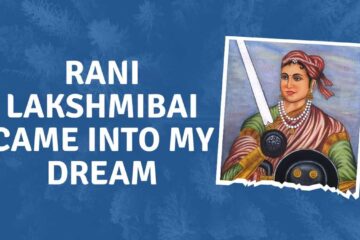
Rani Lakshmibai came into my dream. She wanted me to serve our nation by… Essay
Rani Lakshmibai came into my dream. She wanted me to serve our nation by: In the realm of dreams, where the boundaries of time and space blur, there are moments that transcend the ordinary and Read more…
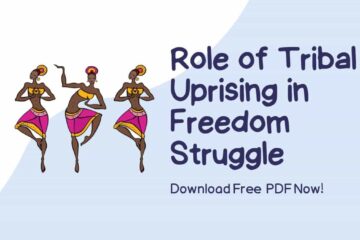
Role of Tribal Uprising in Freedom Struggle Essay in English – Download PDF
Role of Tribal Uprising in Freedom Struggle Essay: The role of tribal uprisings in the Indian freedom struggle is a complex and multifaceted one. While these uprisings were often localized and short-lived, they played an Read more…
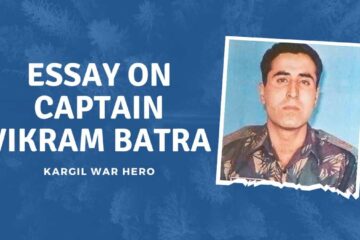
Essay on Captain Vikram Batra Gallantry Award Winner & Kargil War Hero – Download PDF
Essay on Captain Vikram Batra Gallantry Award Winner: In the annals of India’s military history, few names shine as brightly as Captain Vikram Batra’s. A gallantry award winner and a hero of the Kargil War, Read more…
Notifications
Gallantry Awards Social Hub
#salute our bravehearts share.
Ministry of Defence
- Right to Information(RTI)
- Tenders/Positions
- List of Officers(PMO)
Download Gallantry Award Mobile App
- Virtual Museum
- About awards
- Gallantrypedia
Advanced Search
Memorials & museums, motivational videos, war history, interview videos.
- Tweet message
- VIKRAM BATRA
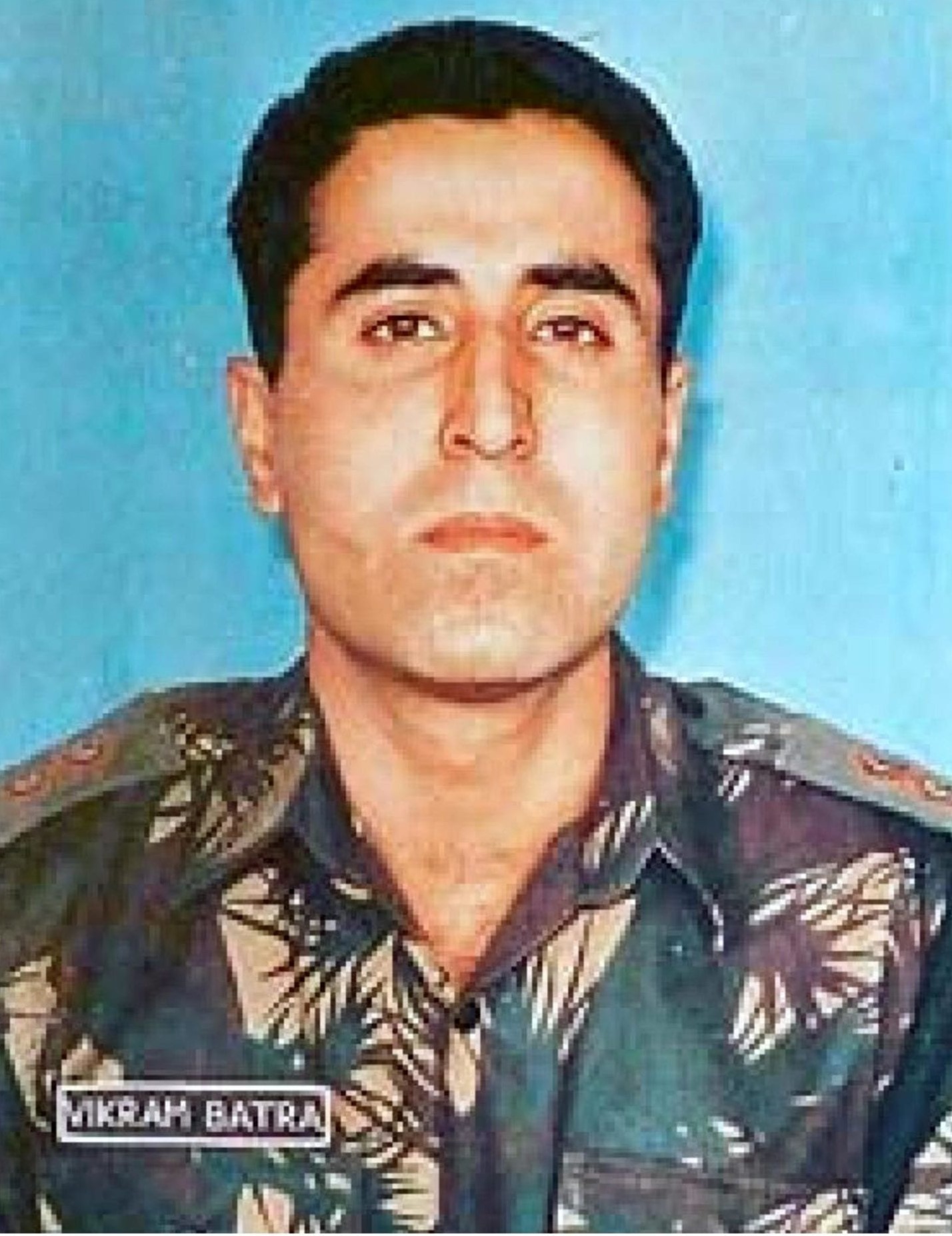
CAPTAIN VIKRAM BATRA
Param Vir Chakra
Citation (PDF)
Rememberance, bibliography, postal stamp.

A bust of Param Vir Chakra Awardee Captain Vikram Batra at the National War Memorial in Delhi. (Source: National War Memorial)
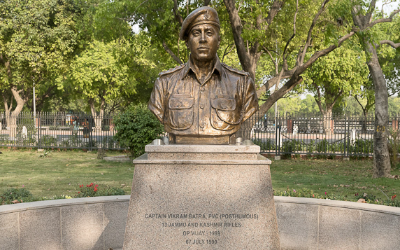
Captain Vikram Batra’s Bust inaugurated at Palampur Military Station, (indianexpress.com)
.jpg)
Captain Vikram Batra’s mother Kamal Batra at the Palampur Military Station memorial (indianexpress.com)
.jpg)
Captain Vikram Batra’s father Girdhari Lal Batra at the Palampur Military Station memorial (indianexpress.com)
.jpg)
Captain Vikram Batra (PVC) filling station set up in Palampur (rediff.com)
.jpg)
Punjab University dedicates shooting range to Kargil War Hero- Captain Vikram Batra (hindustantimes.com)
.jpg)
13 JAK RIF reunion stamp released by Army Postal Service with a photograph of the PVC Awardee from Kargil, Capt Batra
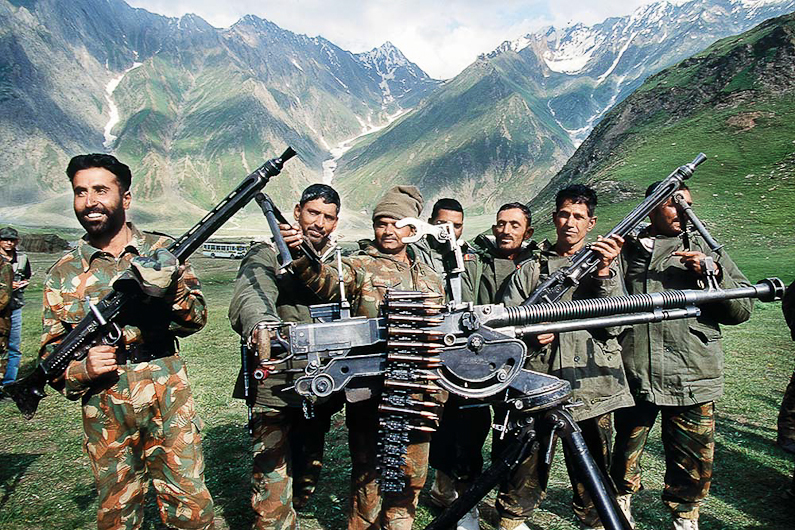
Captain Batra with his team inspecting the weapons. (Source: outlookmagazine.com)
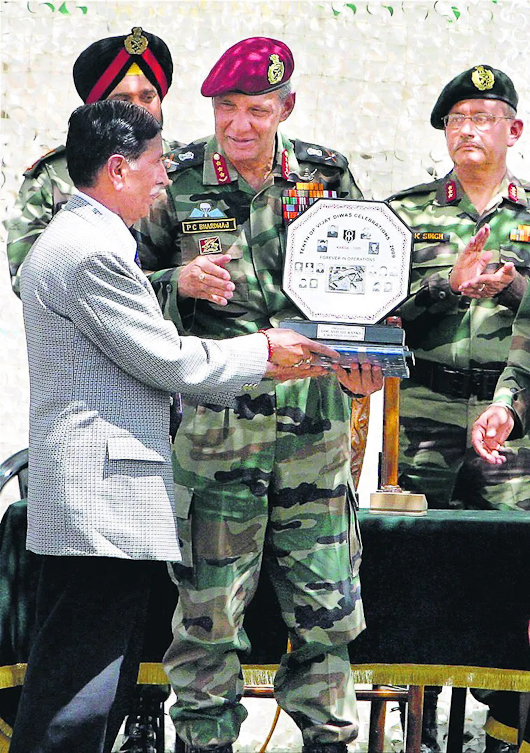
GL Batra, father of Captain Vikram Batra honoured on the 10th Anniversary of Kargil for his son’s supreme sacrifice in the highest tradition of Indian Army. (Source: betterindia.com)
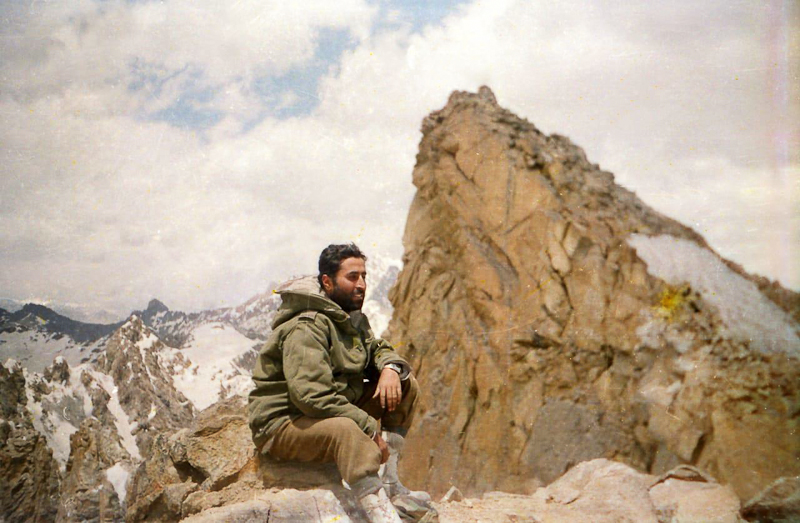
Captain Batra glancing down from the high peaks of Kargil. (Source: thenewsnow.co)
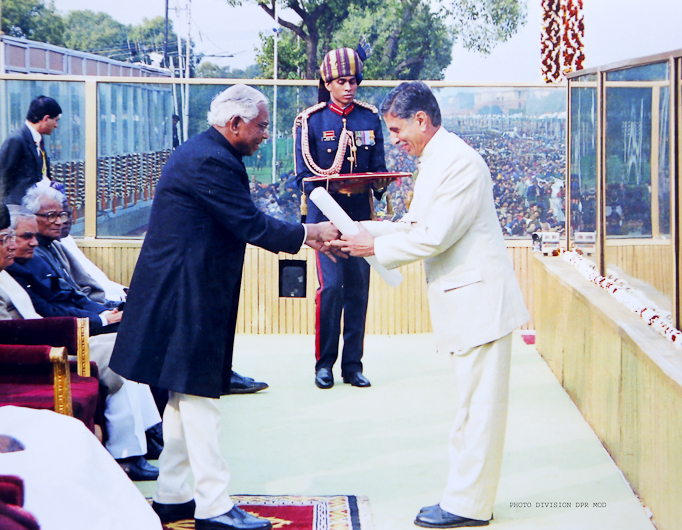
Captain Vikram Batra’s father Girdhari Lal Batra receives the Param Vir Chakra from the then President KR Narayanan, (Source: Photo Division DPR MOD).
- Col. Gurmeet Kanwal. Heroes of Kargil. Army Headquarters, New Delhi. (2002)
- Lt General (retd) YM Bammi, Kargil 1999: The Impregnable Conquered, Gorkha Publishers, New Delhi (2002)
- Colonel SC Tyagi, The Kargil Victory: Battles from Peak to Peak. Speaking Tiger publication (2019)
- Cardozo, Ian, Param Vir: Our Heroes in Battle (2003)
- Ballabh, Anand, Insights into Infantry Regiments: A Basic Factbook. Forward Books publications. New Delhi (2013)
- Gandhi, S.S. Portraits of Valour: India’s Highest Gallantry Awards and Their Recipients. The Defence Review. (Ed 2006).
- Amarinder Singh, “A Ridge Too Far: War in the Kargil heights 1999”, Patiala: Motibagh Palace (2001)
- Captain Vikram Batra (PVC) Honourpoint. (Accessed on 03 May 2022) https://www.honourpoint.in/profile/capt-vikram-batra-pvc/
- Captain Vikram Batra, PVC by GL Batra, (bharatrakshak) (Accessed on 31 May 2022) http://www.bharat-rakshak.com/ARMY/Galleries/Courage/Batra/
- Himachal gets a War Museum at Dharmshala as reminder of Martyr’s. (himachalwatcher.com) (Accessed on 03 May 2022) https://himachalwatcher.com/2017/08/10/himachal-gets-war-museum-at-dharamsala-as-reminder-of-martyrs/
- Shershah: Why the Story of Captain Vikram Batra has enduring appeal, (indianexpress.com) (Accessed on 03 May 2022) https://indianexpress.com/article/explained/explained-why-the-story-of-captain-vikram-batra-has-enduring-appeal-7455335/
- Captain Vikram Batra, the “Sher Shah” Who Died Fighting for India in Kargil (ndtv.com) (Accessed on 31 May 2022) https://www.ndtv.com/india-news/the-legend-of-captain-vikram-batra-the-army-officer-who-died-fighting-for-india-in-kargil-2494970
- Sher Shah of Kargil: The Story of Indian Army Legend, Captain Batra (betterindia.com) (Accessed on 31 May 2022) https://www.thebetterindia.com/120590/vikram-batra-sher-shah-kargil-indian-army-paramvir-chakra-biopic/
- The Kargil War Veteran recalls how Captain Batra saved his life before getting martyred, (scoopwhoop.com) (Accessed on 31 May 2022) https://www.scoopwhoop.com/news/kargil-war-veteran-recalls-how-captain-vikram-batra-saved-his-life-before-getting-martyred/
- He still protects Kargil Mountains’: Remembering Captain Batra where he was martyred 20 Years ago. (news18.com) (Accessed on 31 May 2022) https://www.news18.com/news/india/a-lion-who-fought-despite-fever-when-past-welled-up-tears-in-soldiers-eyes-at-kargil-mountains-2221141.html
- Captain Batra Museum at Captain Vikram Batra Filling Station (PVC), Palampur, Himachal Pradesh. (Youtube- Ananthakrishna Bhat K) (Accessed on 03 May 2022) https://youtu.be/fhSuNW_IEGg
- Capt Vikram Batra, (History Under Your Feet) (Accessed on 03 June 2022) https://historyunderyourfeet.wordpress.com/2014/09/08/captain-vikram-batra/
Captain Vikram Batra, Param Vir Chakra(P), 13 Jammu and Kashmir Rifles
Vishal Batra, the twin brother of Captain Vikram Batra tells the story of Luv and Kush. (Source: The Quint)
Captain Batra’s parents recall the gallant action of their son Captain Vikram Batra as they watch the film- Shershah portraying the life of Captain Batra.(Source: The Quint)
There was one soldier whose life was saved by Captain Vikram Batra. Captain Naveen Nagappa shares the story. (Source: ETimes)
After two decades of Kargil, the iconic snippet from the interview of Captain Vikram Batra was telecasted again by the same news portal that conducted his interview. (Source: NDTV)
Vishal Batra, twin brother of Captain Vikram Batra narrates the story of his brother who made the supreme sacrifice in defending the country. (Source: Tedx Talks)
A narration of the story of Captain Vikram Batra who displayed conspicuous courage and fearless spirit in the face of the enemy. (Source: India Defence)
A documentary on the legendary soldier who laid down his life at Point 4875 fighting the enemy. (Source: Prasar Bharti Archives)
DISCLAIMER:
Photos, links to publications and videos presented here are not intended to serve as a substitute for consultation and should only be used at the user’s own risk. These are primarily shared because of the extensive coverage available on the subject. No copyright infringement is intended and it is not intended to hurt anyone or make sales of any sort. All copyright belongs solely to the relevant owners/creators. Usage here is purely for Fair Usage in accordance with the Indian Copyright Act 1957.
Dear Soldier, this Nation is blessed to have such sons of the soil. Your sacrifice will be eternally remembered.
Contributed by Samriddhi Thakur on GallantryPedia on 2021-12-03 16:39:41
Photo Gallery
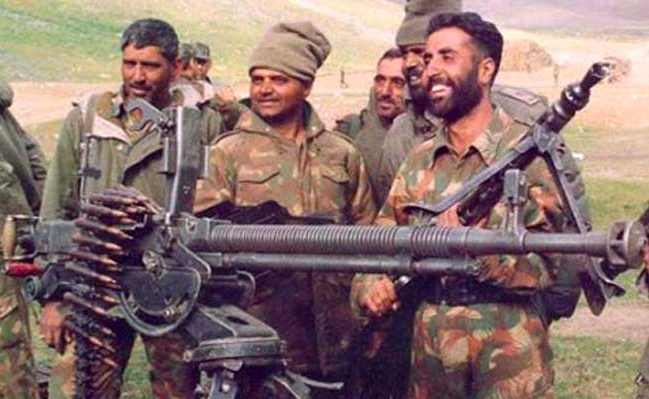
Capt Vikram Batra with his soldiers
Message by1 Pavnesh singh on GallantryPedia on 2021-08-12 22:45:59
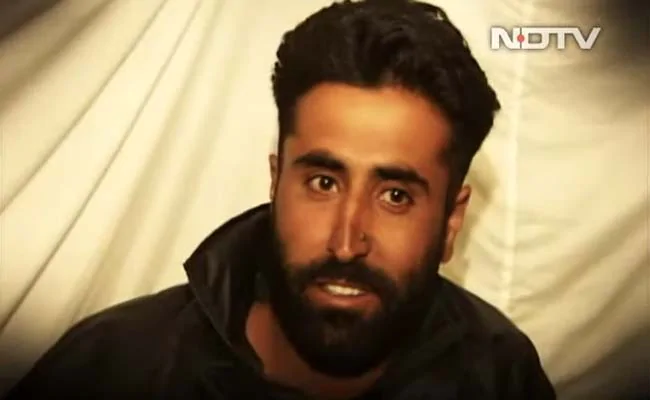
photos of the awardee
Message by1 NIKHIL SAXENA on GallantryPedia on 2021-08-16 11:27:59

Transfer and Postings

Paragraph On Vikram Batra: The Hero Of Kargil War
Paragraph On Vikram Batra: The Kargil War of 1999 was one of the defining moments in the history of India. It was a conflict that tested the courage and resolve of the Indian armed forces, and one that gave rise to many heroic stories of sacrifice and bravery. Among those who stood out was Captain Vikram Batra, who became a national hero for his courage and bravery during the war. In this article, we will take a closer look at the life and legacy of this remarkable soldier and pay tribute to his contributions to the nation.
Table of Contents
Paragraph On Vikram Batra
In this blog Paragraph On Vikram Batra, we include About Paragraph On Vikram Batra, in 100, 200, 250, and 300 words. Also cover Paragraph On Vikram Batra for classes 1, 2, 3, 4, 5, 6, 7, 8, 9, and up to the 12th class and also for kids, children, and students. You can read more Essay Writing in 10 lines about sports, events, occasions, festivals, etc… Paragraph On Vikram Batra is also available in different languages. In this, Paragraph On Vikram Batra, the following features are explained in the given manner.
Early Life And Education
Vikram Batra was born on 9 September 1974 in Palampur, Himachal Pradesh. He was the third of four siblings and grew up in a family that valued education and discipline. His father, G.L. Batra, was a school principal, and his mother, Kamal Kanta Batra, was a teacher. From a young age, Vikram Batra showed an interest in adventure and sports. He was an excellent athlete and participated in many sports events during his school and college years.
After completing his schooling from the DAV Public School in Palampur, Vikram Batra joined the Government College in Palampur for his graduation. He was an outstanding student and was always interested in joining the armed forces. He was particularly inspired by the stories of bravery and valor he had heard about the soldiers who had fought for the country.
Military Career
In 1996, Vikram Batra cleared the Services Selection Board (SSB) interview and joined the Indian Military Academy (IMA) in Dehradun. He was commissioned into the Indian Army’s 13th Battalion of the Jammu and Kashmir Rifles (13 JAK Rifles) in December 1997. He was soon posted to the Siachen Glacier, where he served for two years.
In 1999, when the Kargil War broke out, Captain Vikram Batra was one of the first soldiers to be sent to the front lines. He was part of the team that was tasked with recapturing the peak of Point 4875, which was occupied by the Pakistani troops. The mission was extremely risky, as the peak was at an altitude of 17,000 feet, and the enemy was well entrenched.

On 20 June 1999, Captain Vikram Batra led his platoon in the assault on Point 4875. Despite heavy enemy fire, he led his men with great courage and determination and managed to capture the peak. During the battle, he famously radioed his commanders with the now-famous words, “Yeh dil maange more,” which became a catchphrase in India.
After capturing Point 4875, Captain Vikram Batra was given the task of capturing Point 5140, which was another strategic peak that was held by the Pakistani troops. On 7 July 1999, he led his platoon in a daring assault on the peak. Despite heavy enemy fire, he managed to capture the peak, but was hit by a sniper’s bullet and was killed instantly.
Legacy And Honors
The sacrifice of Captain Vikram Batra was a huge loss for the nation, but it also inspired a new generation of soldiers to serve the country with bravery and dedication. His actions during the Kargil War made him a national hero, and he was posthumously awarded the Param Vir Chakra, the highest military honor in India.
In conclusion, Captain Vikram Batra was a true hero who embodied the spirit of sacrifice and bravery. He dedicated his life to the service of the nation and made the ultimate sacrifice during the Kargil War. His legacy is a testament to the bravery and courage of the Indian armed forces, and he will always be remembered as one of the greatest soldiers of India. As a nation, we must never forget the contributions of soldiers like Captain Vikram Batra and honor their sacrifices by continuing to work towards a better and more prosperous India.
Read More: Kargil Vijay Diwas Paragraph
Paragraph On Vikram Batra (FAQs)
Question 1. Who was Vikram Batra?
Answer: Vikram Batra was an officer in the Indian Army who served during the Kargil War. He was posthumously awarded the Param Vir Chakra, the highest military honor in India.
Question 2. What was Vikram Batra’s role in the Kargil War?
Answer: Vikram Batra played a crucial role in the Kargil War. He led his platoon in the assault on Point 4875 and captured it from the Pakistani troops. He later led another assault on Point 5140 and captured it as well, but was killed in action.
Question 3. What was Vikram Batra’s catchphrase?
Answer: During the assault on Point 4875, Vikram Batra famously radioed his commanders with the words, “Yeh dil maange more,” which means “this heart wants more.”
Question 4. What honors has Vikram Batra received?
Answer: Vikram Batra was posthumously awarded the Param Vir Chakra, the highest military honor in India. He has also been honored in many other ways, including the naming of institutions and memorials after him.
Question 5. What is the significance of Vikram Batra’s legacy?
Answer: Vikram Batra’s legacy is a testament to the bravery and courage of the Indian armed forces. He represents the best of the Indian military and is an inspiration to a new generation of soldiers. As a nation, we must never forget the contributions of soldiers like Captain Vikram Batra and honor their sacrifices by continuing to work towards a better and more prosperous India.
Read More Essays
- Essay On Disaster Management
- Essay About Trip With Family
- The Use Of Internet Service In Modern India 250 Words
- Football Is My Favorite Sport Essay
- Essay On Hockey
- Essay On Air
- 10 Lines On Basketball
- Composition On Internet
- My Favourite Outdoor Game Essay
- Student Essay On Time
Share this:
Leave a comment cancel reply.
You must be logged in to post a comment.

IMAGES
VIDEO
COMMENTS
Tragically, Captain Vikram Batra made the ultimate sacrifice for his country on July 7, 1999, while saving a fellow soldier. His selflessness and unwavering commitment to the nation earned him the Param Vir Chakra, India’s highest wartime gallantry award.
Paragraph on Vikram Batra in 300 Words to Include in Essay. Captain Vikram Batra, also known as “Sher Shah” of the Indian army, is known for his bravery during the Kargil War in 1999. He was born September 9, 1974, in Palampur, Himachal Pradesh.
Sample Essay on Vikram Batra in 100-180 Words. Vikram Batra was a brave and courageous Indian soldier who served in the Indian Army during the Kargil War in 1999. He was born on September 9, 1974, in Himachal Pradesh, India. Batra was known for his fearless attitude and exceptional leadership skills on the battlefield.
Captain Vikram Batra, a decorated officer of the Indian Army, is an emblem of bravery and courage. Born on September 9, 1974, in Palampur, Himachal Pradesh, Batra’s life is a testament to the spirit of selfless sacrifice and patriotism.
Paragraph on Vikram Batra 300 Words, 500 Words and 150 Words. By Kishan Sarvaiya / August 1, 2024. Vikram Batra was a brave soldier in the Indian Army. He was born on September 9, 1974, in Palampur, Himachal Pradesh. Vikram became famous for his courage during the 1999 Kargil War.
Captain Vikram Batra pronunciation ⓘ, PVC (9 September 1974 – 7 July 1999) was an Indian Army officer. He was posthumously awarded the Param Vir Chakra , the highest Indian military decoration , for his actions during the Kargil War ; on 7 July 1999, Batra was killed while fighting Pakistani troops around Area Ledge, Point 4875, in the ...
Captain Vikram Batra, an officer of the Indian Army, is a name that resonates with valor, courage, and the ultimate sacrifice. His indomitable spirit and unyielding commitment to the nation during the Kargil War of 1999 have made him a legendary figure in India’s military history.
Gallantry Award winners essay 300 words. Below is a paragraph or essay on Gallantry Award winners in 300 words, starting with the sentence “My role model is Captain Vikram Batra. The values which I have learnt from his life are…”
A bust of Param Vir Chakra Awardee Captain Vikram Batra at the National War Memorial in Delhi. (Source: National War Memorial)
Among those who stood out was Captain Vikram Batra, who became a national hero for his courage and bravery during the war. In this article, we will take a closer look at the life and legacy of this remarkable soldier and pay tribute to his contributions to the nation.